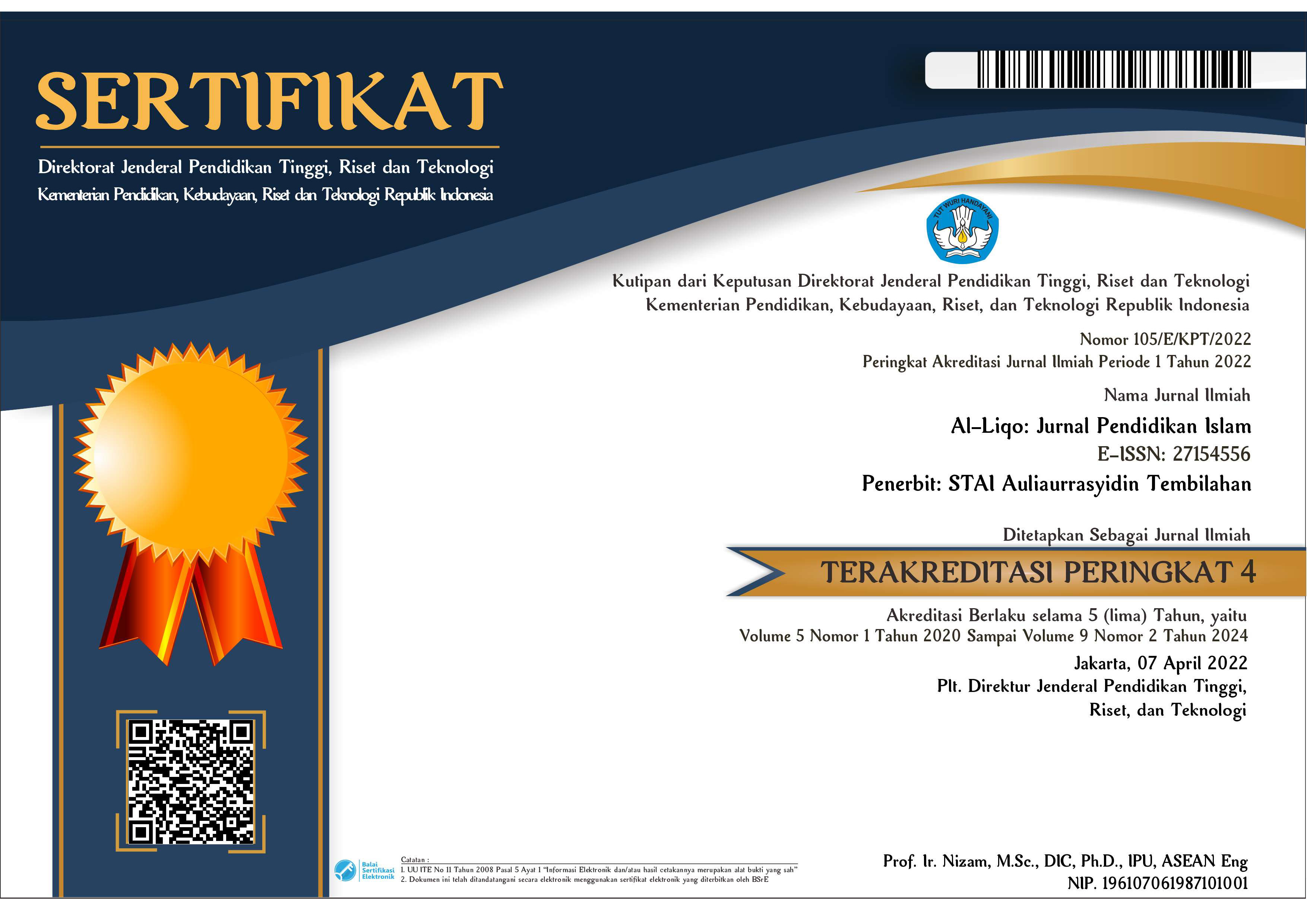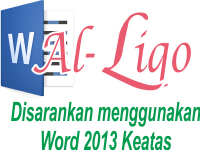Upaya Membentuk Motivasi Belajar Peserta Didik melalui Model Flipped Classroom dalam Pembelajaran PAI
DOI:
https://doi.org/10.46963/alliqo.v9i1.1138Keywords:
Motivation, Flipped Classroom, Islamic Religious EducationAbstract
The purpose of this study was to find out and analyze students' learning motivation through the flipped classroom model in PAI learning. This study uses a qualitative approach by uncovering and studying the application of the flipped classroom learning model in PAI learning. Data collection techniques were obtained through interviews and observations in order to gather information related to the implementation of the flipped classroom model. The research results explain that in the application of this learning model it can be carried out in different times and places between educators and students. This model prioritizes students to be more independent in learning. There are obstacles in the application of this learning, namely the difficulty of educators in monitoring students, students' weak memory, lack of support from parents, school facilities and infrastructure, and students' difficulties in understanding the lessons given. The efforts that can be made are to motivate students in overcoming obstacles from the flipped classroom learning model, namely refreshing, parenting counseling, innovation, and skill improvisation.
Downloads
References
Bergmann, J. (2011). Flipped Classroom Offers New Learning Path. Electronic Education Report, 18(23), 1–3.
Bull, G., Ferster, B., & Kjellstrom, W. (2012). Connected Classroom-Inventing the Flipped Classroom. Learning and Leading with Technology, 40(1), 10.
Doctoroff, G. L., & Arnold, D. H. (2017). Doing Homework Together: The Relation Between Parenting Strategies, Child Engagement, and Achievement. Journal of Applied Developmental Psychology, 48, 103–113. https://doi.org/10.1016/j.appdev.2017.01.001
Gillett-Swan, J. (2017). The Challenges of Online Learning Supporting and Engaging the Isolated Learner. Journal of Learning Design, 10(1), 20–30.
Hamid, A., & Hadi, M. S. (2020). Desain Pembelajaran Flipped Learning sebagai Solusi Model Pembelajaran PAI Abad 21. Quality: Journal of Empirical Research in Islamic Education, 8(1), 1. https://doi.org/10.21043/quality.v8i1.7503
Janatin, Y., Putra, R. W. Y., & Hamid, A. (2019). Upaya Meningkatkan Kemampuan Pemahaman Konsep Matematis Siswa SMP dengan Menggunakan Pembelajaran Model Flipped Classroom. Prosiding Seminar Nasional Matematika dan Pendidikan Matematika, 2(1), 1.
Khoirotunnisa’, A. umi, & Irhadtanto, B. (2019). Pengaruh Model Pembelajaran Flipped Classrom Tipe Traditional Flipped terhadap Hasil Belajar Matematika Siswa pada Materi Bangun Ruang Sisi Datar. Jurnal Math Educator Nusantara: Wahana Publikasi Karya Tulis Ilmiah di Bidang Pendidikan Matematika, 5(2), 2. https://doi.org/10.29407/jmen.v5i2.13484
Marshall, H. W., & Kostka, I. (2020). Fostering Teaching Presence through the Synchronous Online Flipped Learning Approach. TESL-EJ: The Electronic Journal for English as a Second Language, 24(2). https://eric.ed.gov/?id=EJ1268565
Miles, M. B., Huberman, A. M., & Saldana, J. (2019). Qualitative Data Analysis: A Methods Sourcebook. SAGE Publications. https://us.sagepub.com/en-us/nam/qualitative-data-analysis/book246128
Mirlanda, E. P., Nindiasari, H., & Syamsuri, S. (2020). Pengaruh Pembelajaran Flipped Classroom terhadap Kemampuan Penalaran Matematis Ditinjau dari Gaya Kognitif Siswa. Prima: Jurnal Pendidikan Matematika, 4(1), 1. https://doi.org/10.31000/prima.v4i1.2081
Munir, M. T., Baroutian, S., Young, B. R., & Carter, S. (2018). Flipped Classroom with Cooperative Learning as a Cornerstone. Education for Chemical Engineers, 23, 25–33. https://doi.org/10.1016/j.ece.2018.05.001
Nurpianti, S., Sutrisno, & Wijaya, A. F. C. (2019). Implementasi Model Flipped Classroom berbasis Pendidikan untuk Pembangunan Berkelanjutan (PPB) dalam Meningkatkan Keterampilan Berpikir Kritis. Prosiding Seminar Nasional Fisika, 1(1), 1.
Redhana, I. W. (2019). Mengembangkan Keterampilan Abad Ke-21 dalam Pembelajaran Kimia. Jurnal Inovasi Pendidikan Kimia, 13(1), 1. https://doi.org/10.15294/jipk.v13i1.17824
Downloads
Published
Issue
Section
License
Copyright (c) 2024 Almas Sharfina Alaniah, Irma Soraya, Asep Saepul Hamdani

This work is licensed under a Creative Commons Attribution-ShareAlike 4.0 International License.
Authors who publish with this journal agree to the following terms:
1. Copyright on any article is retained by the author(s).
2. The author grants the journal, right of first publication with the work simultaneously licensed under a Creative Commons Attribution shareAlike 4.0 International License that allows others to share the work with an acknowledgment of the work’s authorship and initial publication in this journal.
3. Authors are able to enter into separate, additional contractual arrangements for the non-exclusive distribution of the journal’s published version of the work (e.g., post it to an institutional repository or publish it in a book), with an acknowledgment of its initial publication in this journal.
4. Authors are permitted and encouraged to post their work online (e.g., in institutional repositories or on their website) prior to and during the submission process, as it can lead to productive exchanges, as well as earlier and greater citation of published work.
5. The article and any associated published material is distributed under the Creative Commons Attribution-ShareAlike 4.0 International License







2.png)



